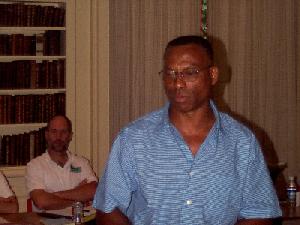Bernard Moitt -
Caribbean Slavery

Bernard Moitt -
Caribbean Slavery

Dr. Bernard Moitt of Virginia Commonwealth University lectured on slavery in the Caribbean
As early as the 1500's, slaves were bought into the Caribbean by the Spanish. Later in the 17th Century, the English and French came in and wars were fought over areas. Sugar became the dominant crop and huge plantations requiring large labor forces were formed. The French Caribbean imported over one million Africans.
The sugar plantations were ruthlessly exploitive since they required intense physical labor and slave masters were free to act with impunity. The population was not maintained by reproduction but was considered to be disposable. The death rates were extremely high.
Dr. Moitt has a forthcoming book, Women in Slavery in the French Antilles: 1635-1848, and he documented the brutality of the system toward women. Women were active in multiple ways of resisting and undermining the system, but they were also exploited.
The diary of Thomas Thistlewood, with its detailed account of his sexual and physical assaults on female slaves, is representative of the capricious and brutal nature of the French slavery toward women.
The Haitian 1791 revolution threw off the French slave system, but it is not recognized or studied as it should be. Nor has the legacy of that revolution produced a modern society that evinces the national growth such a freedom would be thought to engender. Other Caribbean societies tried to emulate this but were unsuccessful.
Dr. Moitt hopes for more research and acknowledgment of these efforts and of individuals such as Jean Jacques Dessalines a general who took over after Toussaint Louverture was betrayed by the French